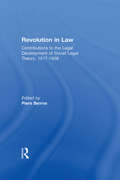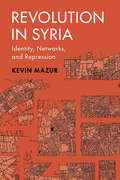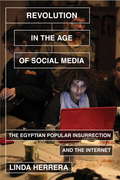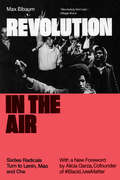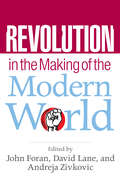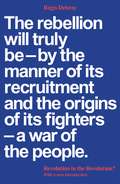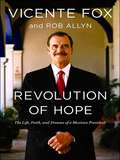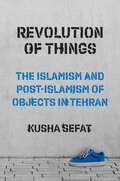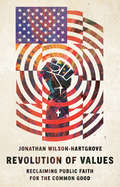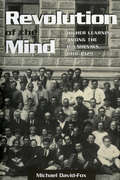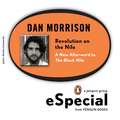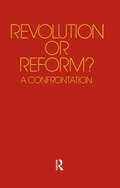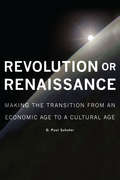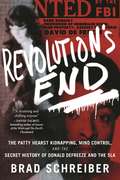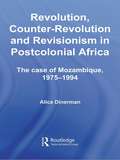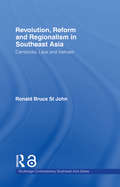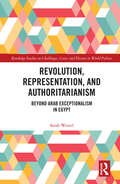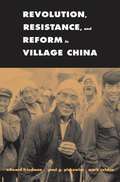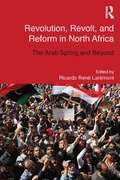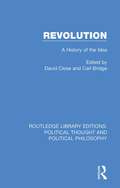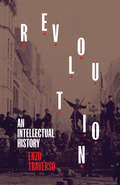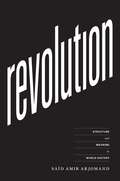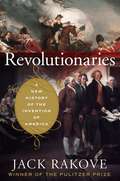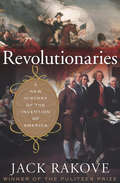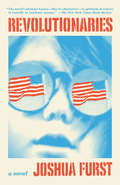- Table View
- List View
Revolution in Law: Contributions to the Legal Development of Soviet Legal Theory, 1917-38
by Piers BeirneThe essays in this volume reassess pre-revolutionary Russian legal culture, the debates of the 1920s over the role of law under socialism, and the abrupt and bloody termination of the debate which took place in the 1930s.
Revolution in Syria: Identity, Networks, and Repression (Cambridge Studies in Comparative Politics)
by Kevin MazurHow does protest advancing diverse claims turn into violent conflict occurring primarily along ethnic lines? This book examines that question in the context of Syria, drawing insight from the evolution of conflict at the local level. Kevin Mazur shows that the challenge to the Syrian regime did not erupt neatly along ethnic boundaries, and that lines of access to state-controlled resources played a critical structuring role; the ethnicization of conflict resulted from failed incumbent efforts to shore up network ties and the violence that the Asad regime used to crush dissent by challengers excluded from those networks. Mazur uses variation in the political and demographic characteristics of locales to explain regime strategies, the roles played by local intermediaries, the choice between non-violent and violent resistance, and the salience of ethnicity. By drawing attention to cross-ethnic ties, the book suggests new strategies for understanding ostensibly ethnic conflicts beyond Syria.
Revolution in the Age of Social Media
by Linda HerreraEgypt's January 25 revolution was triggered by a Facebook page and played out both in virtual spaces and the streets. Social media serves as a space of liberation, but it also functions as an arena where competing forces vie over the minds of the young as they battle over ideas as important as the nature of freedom and the place of the rising generation in the political order. This book provides piercing insights into the ongoing struggles between people and power in the digital age.
Revolution in the Air: Sixties Radicals Turn to Lenin, Mao and Che
by Max ElbaumRevolution in the Air is the definitive study of how radicals from the sixties movements embraced twentieth-century Marxism, and what movements of dissent today can learn from the legacies of Lenin, Mao and Che.
Revolution in the Making of the Modern World: Social Identities, Globalization and Modernity
by David Lane John Foran Andreja ZivkovicThis volume questions whether ideas of revolution are still relevant in the postmodern and globalized world of the twenty-first century. Featuring contributions from some of the world's leading sociological and political thinkers on revolution, it combines theoretical concerns with a variety of detailed case studies of individual revolutions. Subjects covered include: democracy and revolution from 1789 to 1989 twentieth century revolutions and theories of revolution, including Marxism, modernization and structuralist theories revolution in the "Third World" and the variable geometry of the paths to modernity Islamic revolutions and modernity the 1989 revolutions as "democratic revolutions" or "elite-led transitions" globalization, the nation-state and revolution empire and "democratic revolution" network society and revolution Islamic fundamentalism, international terrorism and revolution democratic revolution as a new form of revolution postmodern theories of revolution new social movements, identities and new figures of revolution. Revolution in the Making of the Modern World will be essential reading for students and scholars of comparative politics, political theory, revolution and political sociology.
Revolution in the Revolution?
by Regis DebrayRevolution in the Revolution? is a brilliant, pragmatic assessment of the situation in Latin America in the 1960s. First published in 1967, it became a controversial handbook for guerrilla warfare and revolution, read alongside Che’s own pamphlets, and remains fully as important as the writings of Guevara. Lucid and compelling, it spares no personage, no institution, and no concept, taking on not only Russian and Chinese strategies but Trotskyism as well.The year it was published, Debray was convicted of having been part of Guevara’s guerrilla group and sentenced to thirty years in prison. He was released in 1970, following an international campaign, which included appeals by Jean-Paul Sartre, André Malraux, General Charles de Gaulle and Pope Paul VI.
Revolution of Hope
by Vicente Fox Rob AllynThe charismatic former president of Mexico offers a candid and provocative perspective on the state of world affairs. As president of Mexico, Vicente Fox brought true democracy to the country after seven decades of one party rule. Elected as a political outsider with a message of honesty, change, and hope, he is truly a hero of democracy, and this vivid book interweaves his inspiring personal story with his hopeful new vision for the future of the Americas. President Fox candidly reveals the ups and downs of his relationships with world leaders from George W. Bush and Tony Blair to Fidel Castro, Vladimir Putin, and Hugo Chávez. He also speaks out on hot global topics such as immigration, the war in Iraq, racism, the United Nations, free trade, and the moral imperative to heal the global divide between rich and poor nations. Outspoken, impassioned, sincere, and engaging, Vicente Fox embodies a quality that seems all too rare in world politics these days-the moral character of a genuine leader.
Revolution of Things: The Islamism and Post-Islamism of Objects in Tehran (Princeton Studies in Cultural Sociology #23)
by Kusha SefatAn exploration of the ways that shifting relations between materiality and language bring about different forms of politics in TehranIn Revolution of Things, Kusha Sefat traces a dynamism between materiality and language that sheds light on how the merger of the two permeates politics. To show how shifting relations between things and terms form the grounds for different modes of action, Sefat reconstructs the political history of postrevolutionary Iran at the intersection of everyday objects and words. Just as Islamism fashioned its own objects in Tehran during the 1980s, he explains, tyrannical objects generated a distinct form of Islamism by means of their material properties; everyday things from walls to shoes to foods were active political players that helped consolidate the Islamic Republic. Moreover, President Rafsanjani’s “liberalization” in the 1990s was based not merely on state policies and post-Islamist ideologies but also on the unlikely things—including consumer products from the West—that engendered and sustained “liberalism” in Tehran.Sefat shows how provincial vocabularies transformed into Islamist and post-Islamist discourses through the circulation of international objects. The globalization of objects, he argues, was constitutive of the different forms that politics took in Tehran, with each constellation affording and foreclosing distinct modes of agency. Sefat’s intention is not to alter historical facts about the Islamic Republic but to show how we can rethink the matter of those facts. By bringing the recent “material turn” into conversation with the canons of structural analysis, poststructuralist theory, sociolinguistics, and Middle East studies, Sefat offers a unique perspective on Iran’s revolution and its aftermath.
Revolution of Values: Reclaiming Public Faith for the Common Good
by Jonathan Wilson-HartgroveThe religious Right taught America to misread the Bible.
Revolution of the Mind: Higher Learning among the Bolsheviks, 1918–1929 (Studies of the Harriman Institute)
by Michael David-FoxUsing archival materials never previously accessible to Western scholars, Michael David-Fox analyzes Bolshevik Party educational and research initiatives in higher learning after 1917. His fresh consideration of the era of the New Economic Policy and cultural politics after the Revolution explains how new communist institutions rose to parallel and rival conventional higher learning from the Academy of Sciences to the universities. Beginning with the creation of the first party school by intellectuals on the island of Capri in 1909, David-Fox argues, the Bolshevik cultural project was tightly linked to party educational institutions. He provides the first account of the early history and politics of three major institutions founded after the Revolution: Sverdlov Communist University, where the quest to transform everyday life gripped the student movement; the Institute of Red Professors, where the Bolsheviks sought to train a new communist intellectual or red specialist; and the Communist Academy, headquarters for a planned, collectivist, proletarian science.
Revolution on the Nile: A New Afterword to The Black Nile: A Penguin eSpecial
by Dan MorrisonA New Afterword to The Black Nile<P> An incisive report from the front lines of South Sudan's freedom referendum. In January 2011, weeks before Arab Spring took the world by storm, millions of Sudanese citizens enacted a democratic uprising of their own. In this addendum to his critically acclaimed book, The Black Nile, foreign correspondent Dan Morrison reports on the South Sudan secession from the ground, offering an unflinching portrait of the ideals, interests, and individual lives wrapped up in the struggle for freedom after decades of dictatorial rule.
Revolution or Reform?: A Confrontation
by Herbert Marcuse Thomas MolnarThis series provides a forum for the critical review of enduring issues concerning ethics and society. The text of the debate between Herbert Marcuse and Sir Karl Popper which follows in this volume raises many important issues. The crucial issues between the two participants are (1) their anthropological-axiological positions with respect to the “nature” of man, society, and the practical functions of democracy as a mode of self-government; (2) the conceptions of science and of philosophy which lie behind each thinker’s claims with respect to these; and (3) their respective conceptions of the means required and feasible for attaining their respective social goals. The remarks which follow will attempt to focus upon, and deal critically with, the problems implicit in these three areas.
Revolution or Renaissance: Making the Transition from an Economic Age to a Cultural Age (Governance Series)
by D. Paul SchaferIn Revolution or Renaissance, D. Paul Schafer subjects two of the most powerful forces in the world – economics and culture – to a detailed and historically sensitive analysis. He argues that the economic age has produced a great deal of wealth and unleashed tremendous productive power; however, it is not capable of coming to grips with the problems threatening human and non-human life on this planet. After tracing the evolution of the economic age from the publication of Adam Smith's The Wealth of Nations in 1776 to the present, he turns his attention to culture, examining it both as a concept and as a reality. What emerges is a portrait of the world system of the future where culture is the central focus of development. According to Schafer, making the transition from an economic age to a cultural age is imperative if global harmony, environmental sustainability, economic viability, and human well-being are to be achieved.
Revolution's End: The Patty Hearst Kidnapping, Mind Control, and the Secret History of Donald DeFreeze and the SLA
by Brad SchreiberForty years after the Patty Hearst "trial of the century," people still don't know the true story of the events.Revolution's End fully explains the most famous kidnapping in US history, detailing Patty Hearst's relationship with Donald DeFreeze, known as Cinque, head of the Symbionese Liberation Army. Not only did the heiress have a sexual relationship with DeFreeze while he was imprisoned; she didn't know he was an informant and a victim of prison behavior modification.Neither Hearst nor the white radicals who followed DeFreeze realized that he was molded by a CIA officer and allowed to escape, thanks to collusion with the California Department of Corrections. DeFreeze's secret mission: infiltrate and discredit Bay Area anti-war radicals and the Black Panther Party, the nexus of seventies activism. When the murder of the first black Oakland schools superintendent failed to create an insurrection, DeFreeze was alienated from his controllers and decided to become a revolutionary, since his life was in jeopardy.Revolution's End finally elucidates the complex relationship of Hearst and DeFreeze and proves that one of the largest shootouts in US history, which killed six members of the SLA in South Central Los Angeles, ended when the LAPD set fire to the house and incinerated those six radicals on live television, nationwide, as a warning to American leftists.
Revolution, Counter-Revolution and Revisionism in Postcolonial Africa: The Case of Mozambique, 1975-1994 (Routledge Studies in Modern History #Vol. 3)
by Alice DinermanThis groundbreaking study investigates defining themes in the field of social memory studies as they bear on the politics of post-Cold-War, post-apartheid Southern Africa. Alice Dinerman offers a detailed chronicle of the Mozambican government’s attempts to revise the country's troubled postcolonial past with a view to negotiating the political challenges posed by the present. In doing so, she lays bare the path-dependence of memory practices, while tracing their divergent trajectories, shifting meanings and varied combinations within ruling discourse and performance. Central themes include: the interplay between past and present the dialectic between remembering and forgetting the dynamics between popular and official memory discourses the politics of acknowledgement. Dinerman’s original analysis is essential reading for students of modern Africa, the sociology of memory, Third World politics and post-conflict societies.
Revolution, Reform and Regionalism in Southeast Asia: Cambodia, Laos and Vietnam (Routledge Contemporary Southeast Asia Series #Vol. 8)
by Ronald Bruce St JohnBased on research carried out over the three decades, this book compares the post-war political economies of Cambodia, Laos and Vietnam in the context of their individual and collective impact on contemporary efforts at regional integration. The author highlights the different paths to reform taken by the three neighbours and the effect this has had on regional plans for economic development through the ASEAN and the Greater Mekong Subregion. Through its comparative analysis of the reforms implemented by Cambodia, Laos and Vietnam over the last thirty years, the book draws attention to parallel themes of continuity and change. The author discusses how the three states have demonstrated related characteristics whilst at the same time making different modifications in order to exploit the unique strengths of their individual cultures. Contributing to the contemporary debate over the role of democratic reform in promoting economic development, the book provides a detailed account of the political economies of three states at the heart of Southeast Asia.
Revolution, Representation, and Authoritarianism: Beyond Arab Exceptionalism in Egypt (Routledge Studies on Challenges, Crises and Dissent in World Politics)
by Sarah WesselThis book examines Egypt’s turbulent and contradictory political period (2011-2015) as key to understanding contemporary politics in the country and the developments in the Arab region after the mass protests in 2010/11, more broadly. In doing so, it breaks new ground in the study of political representation, providing analytical innovation to the study of disenchantment with politics, democracy fatigue and social cohesion. Based on five years of intense fieldwork, the author provides rare insights into local and national ideas on politics, justice and identity, and on how people situate themselves and Egypt in the regional and global context. It analyzes how the creation of an alternate, political system was discussed and negotiated among the Egyptian population, the military, the government, public figures, the media, and international actors, and yet nevertheless today, Egypt has a new political regime that is the most repressive in the countries’ modern history. Finally, it recalls the emotions and perceptions of individuals and collectives and interlinks these local perspectives to national events and developments through time. This book will be of key interest to scholars and students of democratization and authoritarianism, Middle East Studies, political representation and informality, collective action, and more broadly to cultural studies and international relations.
Revolution, Resistance, and Reform in Village China
by Edward Friedman Mark Selden Paul G. PickowiczDrawing on more than a quarter century of field and documentary research in rural North China, this book explores the contested relationship between village and state from the 1960s to the start of the twenty-first century. The authors provide a vivid portrait of how resilient villagers struggle to survive and prosper in the face of state power in two epochs of revolution and reform. Highlighting the importance of intra-rural resistance and rural-urban conflicts to Chinese politics and society in the Great Leap and Cultural Revolution, the authors go on to depict the dynamic changes that have transformed village China in the post-Mao era. This book continues the dramatic story in the authors' prizewinningChinese Village, Socialist State. Plumbing previously untapped sources, including interviews, archival materials, village records and unpublished memoirs, diaries and letters, the authors capture the struggles, pains and achievements of villagers across three generations of social upheaval.
Revolution, Revolt and Reform in North Africa: The Arab Spring and Beyond (Routledge Studies in Middle Eastern Democratization and Government)
by Ricardo René LarémontProviding an account of the recent revolutions or reform movements that constituted part of the Arab Spring, this book focuses on these transformative processes in a North African context. Whilst the longer term outcomes of the Arab Spring revolts are not entirely clear, the revolutionary or reform processes in North Africa are further along than the events taking place in Levant or the Arabian Peninsula, elections having now been held in the post-revolutionary/ post-revolt states. Understanding and examining North African events has become critical as the countries in question are part of Mare Nostrum; events in North Africa inevitably have effects in Europe. Using examples from Tunisia, Egypt, Libya, Morocco and Algeria, Revolution, Revolt and Reform in North Africa provides an insider scholar’s account of these recent revolutions or reform movements. One of the first attempts at undertaking an analysis of possible transitions to democracy in the region, this book is a valuable resource for students and researchers with an interest in the Middle East, Political Science or contemporary affairs in general.
Revolution: A History of the Idea (Routledge Library Editions: Political Thought and Political Philosophy #14)
by Carl Bridge David CloseFirst published in 1985. Revolution has been often defined, often abused as a descriptive term for elements of the political process. This book analyses the concept of revolution, and discusses ways in which this concept has changed from Aristotle to the late twentieth-century. The historical circumstances which have shaped the idea and caused it to change are outlined. Special attention is given to the Marxist tradition and to modernisation theory. The case studies comprise the Soviet Union since the Bolshevik Revolution, Nazi Germany 1933-45, China from about 1920, the struggle for political independence and economic development in Guinea-Bissau since the 1950s and the significance of the 1968 explosion in France. This book is intended for undergraduate students of history and politics. The emphasis is placed on the interpretation of political events and ideas. The book also seeks to introduce the vital contribution that can be made to the study of revolution by other disciplines like sociology and philosophy.
Revolution: An Intellectual History
by Enzo TraversoA cultural and intellectual balance-sheet of the twentieth century's age of revolutionsThis book reinterprets the history of nineteenth and twentieth-century revolutions by composing a constellation of "dialectical images": Marx's "locomotives of history," Alexandra Kollontai's sexually liberated bodies, Lenin's mummified body, Auguste Blanqui's barricades and red flags, the Paris Commune's demolition of the Vendome Column, among several others. It connects theories with the existential trajectories of the thinkers who elaborated them, by sketching the diverse profiles of revolutionary intellectuals--from Marx and Bakunin to Luxemburg and the Bolsheviks, from Mao and Ho Chi Minh to José Carlos Mariátegui, C.L.R. James, and other rebellious spirits from the South--as outcasts and pariahs. And finally, it analyzes the entanglement between revolution and communism that so deeply shaped the history of the twentieth century. This book thus merges ideas and representations by devoting an equal importance to theoretical and iconographic sources, offering for our troubled present a new intellectual history of the revolutionary past.
Revolution: Structure and Meaning in World History
by Saïd Amir ArjomandA revolution is a discontinuity: one political order replaces another, typically through whatever violent means are available. Modern theories of revolutions tend neatly to bracket the French Revolution of 1789 with the fall of the Soviet Union two hundred years later, but contemporary global uprisings—with their truly multivalent causes and consequences—can overwhelm our ability to make sense of them. In this authoritative new book, Saïd Amir Arjomand reaches back to antiquity to propose a unified theory of revolution. Revolution illuminates the stories of premodern rebellions from the ancient world, as well as medieval European revolts and more recent events, up to the Arab Spring of 2011. Arjomand categorizes revolutions in two groups: ones that expand the existing body politic and power structure, and ones that aim to erode—but paradoxically augment—their authority. The revolutions of the past, he tells us, can shed light on the causes of those of the present and future: as long as centralized states remain powerful, there will be room for greater, and perhaps forceful, integration of the politically disenfranchised.
Revolutionaries: A New History of the Invention of America
by Jack N. RakoveIn the early 1770s, the men who invented America were living quiet, provincial lives in the rustic backwaters of the New World, devoted primarily to family, craft, and the private pursuit of wealth and happiness. None set out to become "revolutionary" by ambition, but when events in Boston escalated, they found themselves thrust into a crisis that moved, in a matter of months, from protest to war. In this remarkable book, the historian Jack Rakove shows how the private lives of these men were suddenly transformed into public careers-how Washington became a strategist, Franklin a pioneering cultural diplomat, Madison a sophisticated constitutional thinker, and Hamilton a brilliant policymaker. Rakove shakes off accepted notions of these men as godlike visionaries, focusing instead on the evolution of their ideas and the crystallizing of their purpose. In Revolutionaries, we see the founders before they were fully formed leaders, as individuals whose lives were radically altered by the explosive events of the mid-1770s. They were ordinary men who became extraordinary-a transformation that finally has the literary treatment it deserves. Spanning the two crucial decades of the country's birth, from 1773 to 1792, Revolutionaries uses little-known stories of these famous (and not so famous) men to capture-in a way no single biography ever could-the intensely creative period of the republic's founding. From the Boston Tea Party to the First Continental Congress, from Trenton to Valley Forge, from the ratification of the Constitution to the disputes that led to our two-party system, Rakove explores the competing views of politics, war, diplomacy, and society that shaped our nation. Thoughtful, clear-minded, and persuasive,Revolutionaries is a majestic blend of narrative and intellectual history, one of those rare books that makes us think afresh about how the country came to be, and why the idea of America endures.
Revolutionaries: A New History of the Invention of America
by Jack Rakove&“[A] wide-ranging and nuanced group portrait of the Founding Fathers&” by a Pulitzer Prize winner (The New Yorker). In the early 1770s, the men who invented America were living quiet, provincial lives in the rustic backwaters of the New World, devoted to family and the private pursuit of wealth and happiness. None set out to become &“revolutionary.&” But when events in Boston escalated, they found themselves thrust into a crisis that moved quickly from protest to war. In Revolutionaries, a Pulitzer Prize–winning historian shows how the private lives of these men were suddenly transformed into public careers—how Washington became a strategist, Franklin a pioneering cultural diplomat, Madison a sophisticated constitutional thinker, and Hamilton a brilliant policymaker. From the Boston Tea Party to the First Continental Congress, from Trenton to Valley Forge, from the ratification of the Constitution to the disputes that led to our two-party system, Rakove explores the competing views of politics, war, diplomacy, and society that shaped our nation. We see the founders before they were fully formed leaders, as ordinary men who became extraordinary, altered by history. &“[An] eminently readable account of the men who led the Revolution, wrote the Constitution and persuaded the citizens of the thirteen original states to adopt it.&” —San Francisco Chronicle &“Superb . . . a distinctive, fresh retelling of this epochal tale . . . Men like John Dickinson, George Mason, and Henry and John Laurens, rarely leading characters in similar works, put in strong appearances here. But the focus is on the big five: Washington, Franklin, John Adams, Jefferson, and Hamilton. Everyone interested in the founding of the U.S. will want to read this book.&” —Publishers Weekly, starred review
Revolutionaries: A novel
by Joshua Furst Joshua SessionsIn his second novel, the acclaimed author of The Sabotage Café leads us on a long, strange trip through the heart of the sixties and beyond, as seen through the eyes of the revolution's poster child.Fred is the sole offspring of Lenny Snyder, the famous (or notorious) pied piper of the counterculture, and in middle age he hates being reminded of it. But neither can he ignore any longer his psychedelically bizarre childhood. From infancy, for instance, he was called Freedom (in fact his given name) not only by those who should have known him but also by members of the burgeoning movement led by his father, who happily exploited having his wife and his toddling, then walking and talking, and finally observant son in tow. Thanks to Fred, this charismatic, brilliant, volatile ringmaster is as captivating in these pages as he was to his devoted disciples back then. We watch Lenny organize hippies and intellectuals, stage magnificent stunts, and gradually lose his magnetic confidence and leading role as the sixties start slipping away. He demands loyalty but gives none back in return, a man who preaches love but treats his family with almost reflexive cruelty. And Fred remembers all of it--the chaos, the spite, the affection. A kaleidoscopic saga, this novel is at once a profound allegory for America--where we've been and where we're going--and a deeply intimate portrait of a father and son who define our times.
